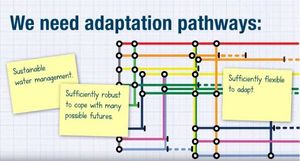LC 00363: verschil tussen versies
Geen bewerkingssamenvatting |
Geen bewerkingssamenvatting |
||
| Regel 18: | Regel 18: | ||
|Topcontext=PR 00069 | |Topcontext=PR 00069 | ||
|Toppage=Other | |Toppage=Other | ||
|Sequence number= | |Sequence number=189062 | ||
|Context type=Situation | |Context type=Situation | ||
|Heading=Adaptive planning | |Heading=Adaptive planning | ||
Versie van 17 apr 2020 13:04
What is adaptive planning?
Adaptive planning is (1) is anticipatory instead of responsive and (2) explicitly recognizes uncertainties about the future and takes these into account in the management planning (Klijn et al., 2015).
Adaptive planning in the MLS concept
Dynamic Adaptive Policy Pathways (DAPP) is a method for decision making under deep uncertainties future arising from social, political, technological, economic, and climate changes. It is a method that combines two approaches for designing adaptive planning: ‘adaptive policymaking’ and ‘adaptive pathways’ (Haasnoot et al., 2013). The FRAMES pilots working on adaptive planning look at measures in layer 1, layer 2 and layer 3.
Image depicting DAPP approach (Deltares).
Adaptive planning and FRAMES pilots
In FRAMES, two pilot projects in Denmark, Assens and Vejle, aimed to adjust and apply the DAPP approach in combination with MLS measures to create adaptation development plans for flood proof cities.
What tools were used in the FRAMES pilots working with adaptive planning?
FRAMES has compiled a list of tools used in the pilots and classified these per layer. Click here to find out what tools are available for layer 2, layer 3 and layer 4 - the layers considered in the pilots working on adaptive planning.
Referenties
- Adaptive planning for flood resilient areas: dealing with complexity in decision-making about multilayered flood risk management, Buijs, J-M., Boelens, L., Bormann, H., Restemeyer, B., Terpstra, T., HZ University of Applied Sciences, 1 januari 2018.
- Guide to dynamic planning Assens Vejle, Danish Coastal Authority, Danish Coastal Authority, 30 mei 2020.
- Medway Flood Action Plan, Environment Agency, 1 november 2017.
- Stakeholder analysis report FRAMES, FRAMES Consortium, 1 januari 2020.
- Adaptive capacities FRAMES definitions and examples, Gupta et al, 20 april 2020.
- Dynamic Adaptive Policy Pathways: supporting decision making under uncertainty using Adaptation Tipping Points and Adaptation Pathways in policy analysis, Haasnoot et al., Deltares, 1 januari 2013.
- Adaptive flood risk management planning based on a comprehensive flood risk conceptualisation, Klijn et al., 12 maart 2015.

